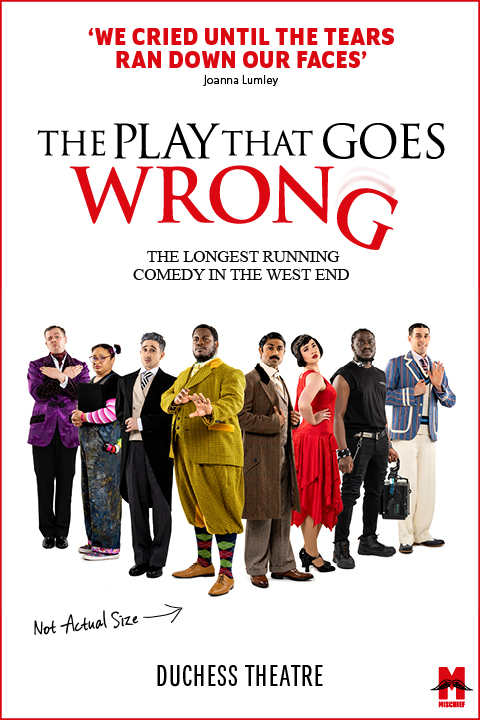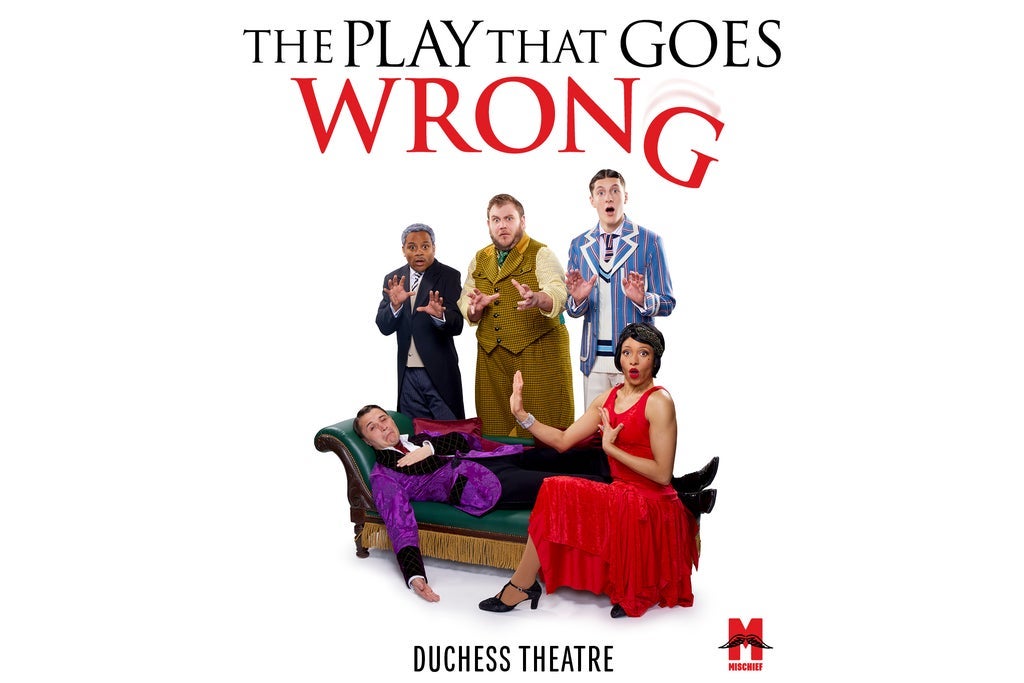Interview: 'We Talked About a Ten Week Run': Henry Lewis, Jonathan Sayer And Henry Shields on Celebrating 10 Years of THE PLAY THAT GOES WRONG
'At every point for the last ten years, we've never really known that it's going to necessarily continue, but it has!'

The Olivier Award-winning comedy, The Play That Goes Wrong, is celebrating its 10th anniversary on the West End at the Duchess Theatre. Recently, we had the chance to speak with the writers of the show, , Jonathan Sayer and Henry Shields on what it is like to be celebrating this anniversary, including how the show has grown over the years and what some of their favourite moments have been!
So starting with a bit of a general question, how did you each get started in the worlds of theatre and comedy?
Lewis: I, like a lot of people, I suppose, went to youth theatre. I didn't go to a very “theatrey” school. There was no theatre at all, in fact, at my secondary school, so I did all my theatre outside of school. And I went to a youth theatre in Ealing called Questors Community Theatre and did productions and classes there. That was where I first started doing shows.
Shields: My first semi-professional bit of comedy was a sketch show I did at university called A Suitcase Full of Nothing that was warmly received but poorly written [Laughs]. It had its ups and downs, and we actually ended up reusing a couple of the jokes for a very short-lived sketch show that we did years later as Mischief. But I did that at King's College University, which I attended for about four months, and spent my entire time just playing around with the comedy society and the acting society and doing no work before I dropped out.
Sayer: I was brought up on a diet of Morecambe and Wise, an old British comedy duo. I used to go to my grandparents and they’d just put that on all the time. I always knew growing up [that] I wanted to do that. I wanted to be Eric Morecambe. Obviously, that's not a job, so I went to drama school and eventually found my friends and people who also wanted to be Eric Morecambe, or people similar to that, and found myself writing sketches in little comedy plays when I was at secondary school and sixth form.
And can you tell us a bit about the beginnings of The Play That Goes Wrong?
Lewis: We certainly can! So following on from Questors, there was a guy there called . It [Questors] was a youth theatre, but it was also an amateur theatre, and he was a member. He wrote a book in the ‘60s called The Art of Coarse Acting, which was a book about all about his time in amateur theatre and funny stories of crazy things that happened. That was a very popular book, and he then wrote a series of “Coarse Acting” plays, which were plays where things went wrong, basically. So I worked a bit with him when I was at youth theatre, so that was kind of where the idea came from.
We all met LAMDA [London Academy of Music & Dramatic Art] and have been doing lots of improv together for a long time. We graduated and we said, “Well, wouldn't it be great to do a scripted show?” Why don’t we try doing a “goes wrong” thing? It wasn't called Goes Wrong at that point - it was just called The Murder Before Christmas. That was the first title the show had, and we did it at the Old Red Lion. It was a 50-minute show. That was the first ever outing in Christmas 2012, and then it grew from there. So we brought it back the next year, we improved it a bit, and then we took it to Trafalgar Studios, then we went to Edinburgh. We expanded it and wrote a second act, and it went on tour. And then it came into the West End! That was the genesis.
What was the creative process like for the show, especially from the original version of the show to what it is today?
Sayer: The process was very iterative because we did so many different versions. There was lots of going back, doing small rewrites, workshopping or rehearsing it and then performing it and constantly crafting and changing it. We'd show an audience, find out if that got a laugh, and then either kept it or didn't keep it, depending on the response. That's probably why that show is so rich in laughs, because it had such a long process of being shown to people, and an environment where it wasn't being reviewed and wasn't being seen by loads and loads of people. So by the time it was being seen by larger people and being reviewed, it was really solid.
When we were first writing it, we were all doing different jobs and stuff, so we'd get back to our flat - we were all living together - and we would write into the small hours of the morning and just make each other laugh. It was a bit of the day that we really looked forward to - we didn't particularly enjoy our side hustle jobs. And then when we met Kenny and Mark, who are our commercial West End producers, they said, “If you can do two acts . . .” At the time, we were playing the Pleasance Above, which was like 120 seats, and then all of a sudden, we had to play the Canterbury Marlowe, which is 1,200 seats, a huge scale-up!
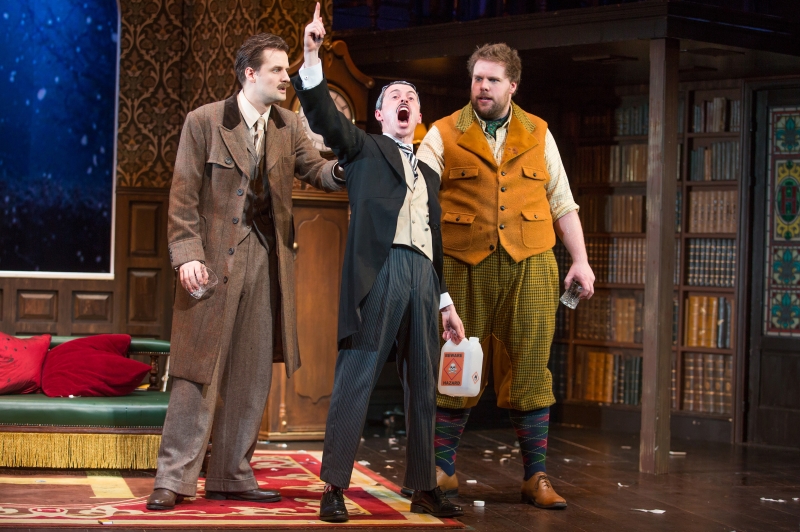
Photo Credit: Jay Brooks
And what was it like finally bringing the show to the West End after all that work?
Shields: It was great!
Lewis: It was amazing! It was very exciting. We often talk about the moment where we were at the Old Red Lion and we we found out that we were going to the Pleasance Courtyard for the Edinburgh Festival. We'd been trying to get into the Pleasance Courtyard for so long, so that felt like a huge moment, whereas the move to the West End was more gradual. We knew that they'd come in to see it, and we'd been doing this really long tour of the UK. We thought maybe we'd do a few weeks in the West End at the end, so when we found out we got the theatre, we were obviously really excited, but we thought it would just be a few extra weeks on the end of the tour. We didn't know that it would run for a long time!
You're always told in the West End that most contracts with the theatre have a two-week break clause, so if you're below your break-even point for two weeks in a row, they can chuck you out. They might not chuck you out, but they can. So you're always a bit like, “Oh my goodness, we've got to be careful, we gotta stay above the break-even!” So we started in September, we got past Christmas . . . Even then we thought, “Well, you know, this is a tougher time of year. Christmas is busy. The spring is less busy. Will we get through?” So we were doing our first year in the show. We didn't know if we’d get to the end of that year, and then once we left it, again, there was more uncertainty. We thought, “Well, we’ve got a new cast coming in. Is it going to carry on beyond that?” At every point for the last ten years, we've never really known that it's going to necessarily continue, but it has!
Sayer: A really important thing to remember is - I sound like an old man here - particularly in the age of social media, where there's a narrative that stuff is going not so well, and then you've made it and then it's okay. And in theatre, that's sadly not the case. You've constantly got to be maintaining and working, and as soon as that work drops in intensity, in any way, you're on the ropes. It's very good fun, but there's a tremendous amount of people on The Play That Goes Wrong, from the creative team to the production staff at Kenny's office and Harry in our Marketing Department, who put so much work into just keeping that plate spinning and spinning well. So there's not a moment where you can be like, “Oh, it's done really well.”
You just take each couple of weeks as it comes. I remember I used to find that harder to enjoy. Like the thing that Hen’s just said about the break clause, I remember finding that utterly alarming when we first started! So I was just like, “Well, we’re only a fortnight from closing!” But it's a lot of fun. It's been a lot of fun.
What was it like having those special moments, like when you won the Olivier?
Lewis: It was a fun evening. It was a big surprise! We were not expecting it at all.
Shields: It was a massive surprise!
Lewis: Because we were up against Shakespeare in Love, this huge show based on a movie, we thought that certainly had more of a chance, or one of the other shows. So it was a big surprise, for sure!
Sayer: It was very nice. I feel that we're not very good at relaying how nice certain moments were! [Laughs] It was fantastic and surreal.
Shields: It was really cool! For me, it was hard to gauge how big a deal it was at the time. Obviously, I knew it was a big deal, but it was weird because it was really our first crack, and it had gone that well, whereas now, we've subsequently lost so many times! [Laughs] I feel like if we were to win one, it would be a massive deal now. It'd be like, “Oh, wow, we made it!”
Lewis: We didn't have any expectation of winning at all, so it was a strange thing.
Shields: Slightly baffling and slightly overwhelming at the time.
So then you brought The Play That Goes Wrong to New York in 2017. What was that like?
Lewis: That was amazing! It was a real adventure. All of us uprooted our lives and moved to New York and plonked down there for six or seven months, and it was incredible. I've been on holiday, but I never lived and worked somewhere other than in the UK. So it was really unique place. New York's an amazing city and it's really fun. There's a real sense of community between the Broadway shows, probably more so than in the West End, just because all the theatres are within a couple of blocks of each other and everything's very close by. So there's lots of loads of little initiatives like ice cream socials, and, “This theatre is going to say hi to this theatre!” And “Everyone come and see our matinee this week!”.
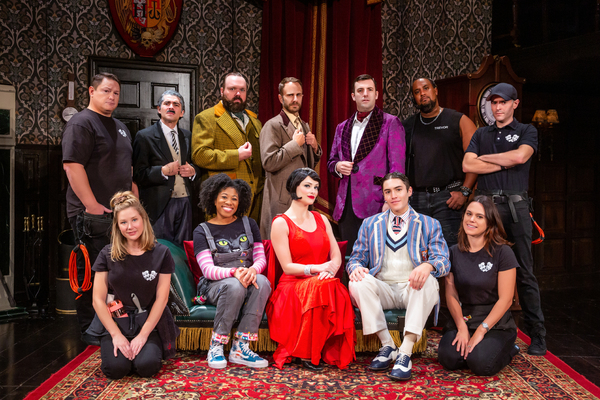
Photo Credit: Jeremy Daniel
It's very friendly and nice amongst all the different shows, but it's also scary because the show is much more expensive to do a show on Broadway. It’s like a quarter of a million pounds to capitalise the show in the West End, $4 million to capitalise the show on Broadway. But it is very exciting, an amazing place. We had a blast there. And the show's still running there! It's off-Broadway now, in a smaller theatre, but still going strong. So it's been really nice that it's connected with that audience.
So now the show's taken on quite a life of its own, still going on in both the West End and off-Broadway. What is it like to see it grow like this?
Lewis: Amazing, really! It's got a life of its own and it's always cool to see new people take it on and do it. It’s always fun to see. Whenever you go and see it in the West End, there's always people there who are seeing it for the very first time, and that's surreal, because it's been such a big part of our lives and our history over the last ten years. But it's always really nice to see the family continue to grow and new people coming in. It’s really special.
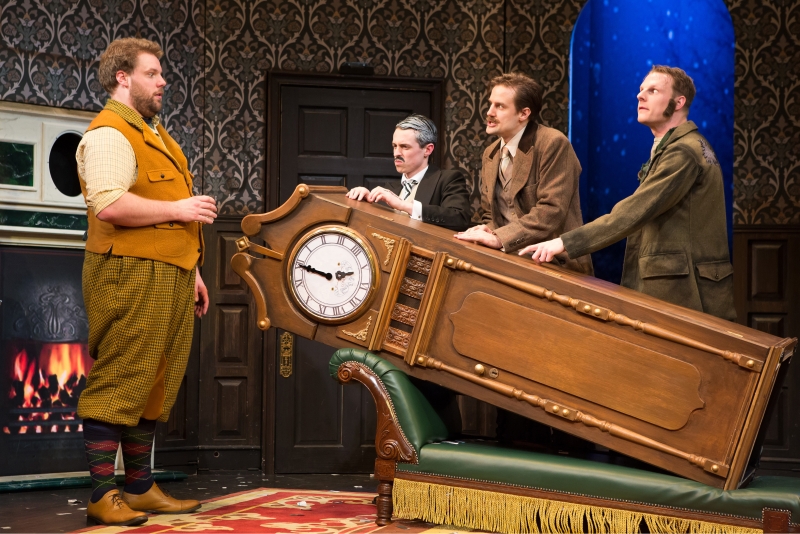
Photo Credit: Jay Brooks
Do you have any particular favourite moments in the show, either watching or when you're performing it?
Shields: There are a lot of moments, so I'll try and pick a different one to the ones I always go for. I'm a big fan of the clock moment - it's not really a moment, it's quite a lot of moments - the bit at the end where the clock is put on the chaise and they pretend the clock is a woman. I'm a big fan of that moment, partly because it's very silly and funny. It was quite a late addition!
That was one of the last things we added to the script when we were turning it into the two-act. I was particularly proud of it because it's one where we really mined what we had already. And that was the way I remember that it was written, where we said, “Rather than adding in loads of new elements, let's see how many jokes we can possibly get out of one thing.” During the show, there must be over a dozen laughs that are the result of that clock! It's used to knock people out, the hands coming off, the time being wrong, it tipping over and being someone who's fainted, it being put on the chaise, the chaise breaking, people getting handcuffed to it . . . That clock gets so much work done just for one prop, and I think that's brilliant. I think that's what comedy should be, mining deeper into one thing to a relentless extreme.
Sayer: There were jokes as well that have gone! There was a joke really early on where Perkins can't get out of the room at the start, he then goes into the clock. And then there was a moment where it was like, “Hand me Florence's pills,” and then he just opened the clock and I handed the pills.
Shields: We hide Trevor in the clock . . . What else do we do? We do the magic trick with the clock where Sandra appears out of the clock . . .
Sayer: Just a little tiny moment I like - it still makes me laugh. Just the line, “She's run off.” [Laughs] Now, when I watch it, not all the moments make me genuinely giggle. It's more like I'm pleased to see them, like old friends - I know what they're going to say. But that moment, for whatever reason, still makes me giggle!
Lewis: A favourite moment of mine is when they take the dead body upstairs. There's lots of good stuff with that - him coming in later, and all that stuff. And then the body lies down on the front of the mezzanine level, and the fingerprint powder gets dropped, and he coughs, and then rolls and falls off the thing and is struggling to get back up and falls down. [Laughs] It's just such a huge disruption to what's supposed to be happening! That always makes me laugh quite a lot. And when you get someone who can really do that brilliantly and make it look accidental and make the fall look quite brutal, it's very good.
%20Matt%20Crockett.jpg)
Photo Credit: Matt Crockett
So what is it like to be celebrating the 10th anniversary of The Play That Goes Wrong on the West End?
Sayer: It's very nice! It's very exciting. It's been quite fun to have lots of conversations like this, looking back on it. As a company that has done well, because we're quite focused on the future and what's next and the way forward, it's been nice to be pushed into a place where you're being a bit more reflective and looking back. It just makes me feel really pleased and proud of everyone that has played a part.
Lewis: Yeah, absolutely agree with all that. It's surreal! We literally talked about the run being ten weeks at the beginning, so for it to have run ten years is mad and amazing, and we hope that it continues for many more years. Being able to make people laugh is a real privilege, so I feel very lucky.
What advice do you have for anyone looking to get into writing comedy?
Shields: I think the first step is just immersing yourself in comedy. Watching, reading, listening to as much as you possibly can of every different type of comedy. That's the best way. I think the human brain learns by just absorbing. Then you just have to do it, and you have to be willing to make mistakes. A really good phrase for a writer is, “You can't rewrite no pages. You can rewrite bad pages.” You have to start out by writing really crap comedy. You have to be willing to make those mistakes and you have to accept that you are going to be bad for a while, and that's just part of it.
Lewis: My big one is you've got to be persistent and patient and crack on. Not everything will work, but things that don't work, you're learning from, and that's definitely been our path. We often talk about Play That Goes Wrong as the beginning of our journey, but even the first outing of that certainly wasn't the beginning of our journey. We'd done lots of other stuff before that, tried different shows and different things. And then with Play That Goes Wrong, there were so many iterations. We did two runs at the pub theatre, one long run at the West End studio space, then Edinburgh, then on tour, and then into the West End. So it's six versions of refining and editing, cutting things out, making it as lean as it can possibly be. I think a lot of people do a comedy show and take it to the first level, or even the second level, but to keep going and keep redoing and re-improving it, that's quite often a common link between things that do quite well as people are keen to take the next step with it and see how you can develop and grow it.
Sayer: Here's one as well - the whole thing of taking the work seriously, but not yourself, knowing practically how to do that. Because once you start taking yourself seriously, you become less funny. You struggle to see the funny in life. It's quite a useful tool, to genuinely be humorous in life, in the same way that you might get told to practice gratitude.
And finally, how would you each describe The Play That Goes Wrong in one word?
Shields: Farce.
Lewis: Funny, hopefully!
Sayer: Comedy.
The Play That Goes Wrong is currently booking at the Duchess Theatre until May 2025


